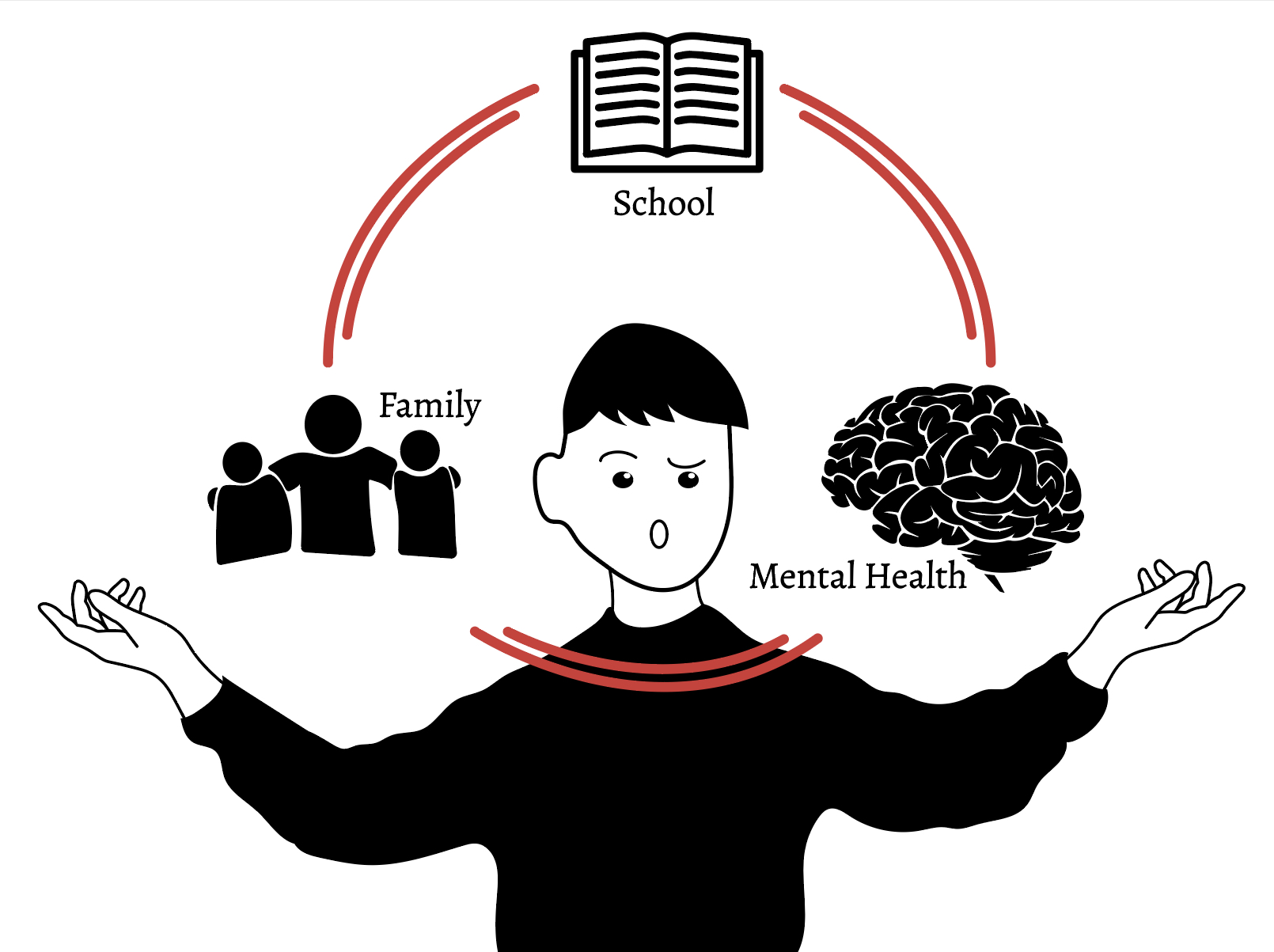
Voice Staff Writer Danny Oh learns how to juggle during Welcome Day. Robin Wyllie-Scholz | Washtenaw Voice
By Danny Oh
Staff Writer
At WCC Welcome Day, I asked strangers to teach me to juggle. Here’s what they told me to try:
- Start with two in one hand
- Juggle handkerchiefs to extend air time
- While juggling two across, say ‘now’ to mark the third release
- Throw slowly, and in a high arc
- Keep your eyes at a steady level
Here’s what I did:
- Repeatedly dropped stress balls for 3 hours at 2 a.m.
- Forgot about it
- Watched a YouTube video and realized my timing is completely wrong
- Got it right for three seconds; impulsively bought juggling balls; temporarily accepted juggling as my life
- Gave up and played games with friends

Illustration by Grace Faver | Washtenaw Voice
Xiong Yiliao, a famed Chinese warrior who lived around 600 B.C., reportedly ended a battle between two Chinese armies by juggling nine balls, in which his raw display of juggling prowess intimidated the opposing side to surrender. I am not Xiong Yiliao. However, absence of talent can work in one’s favor. The sight of me flailing pitifully set a low enough bar that most people became willing to give juggling a shot.
Exactly how bad I was at juggling was emphasized to me by a woman at Welcome Day, the one who gave the advice about trying handkerchiefs. She had taught juggling to elementary schoolers. Apparently, the average time for kids to learn juggling was 15 minutes. This was depressing to me on two levels. First, it made me less adequate than an average elementary schooler. Second, it made me feel old and stupid, and that I was going to die soon.
I’m terrible at juggling, but I like it. I like it because I’m terrible at it. After thinking about it, I can give two reasons why I’m bad at juggling: a concrete reason, and a more sketchy life-metaphor.
The concrete reason is that I’m generally an uncoordinated person. I have traumatic memories of spinning in the opposite direction of everyone else during a youth church dance recital, friends laughing at me as I turned around in circles in a campus I’ve lived around my whole life, and the 23andme report confirming that I have DNA associated with “ a worse sense of direction.” If there’s a gene that regulates juggling, it’s surely skipped me.
The sketchy life-metaphor is that juggling is a stand-in for how one responds to difficult life problems. There’s a classification of these responses that goes by trauma reaction, more commonly known as the 4Fs: fight, flight, freeze, and fawn. I am what’s known as a “freezer”. However, in juggling, you can’t freeze.
Not freezing, in juggling/in life, amounts to (1) not locking up and (2) maintaining awareness.
Locking up is the absence of any reaction. When I throw a ball and can’t react in time, I can feel the physiological force of my entire body tensing up. Then, one part screams, “This isn’t happening!” Another part yells, “Yes, it is, you idiot. Do something.” Finally, nothing. This is why doing anything, whether it’s grunting, bobbing your head, saying “Third!”, is good training for juggling. It teaches you to not freeze.
Maintaining awareness means to pay constant attention to your surroundings. In juggling, you can’t throw one ball three times and call it done. You need to be aware of all the balls, of the system as a whole.
The analogy to life is that there are some life problems that simply get solved away. For instance, if the problem is to become a millionaire, the solution is to become a millionaire. Done. Easy. However, for the truly big problems–deep addictions, vices, character flaws–it’s not so easy. They’ll come back, like juggling balls, orbiting way over your head, crashing down and hitting you when you least expect it. So you need to always be aware of their existence, of their cyclicity.
I dropped out my first year of college because I was either spending all my time in my room depressed, or out with friends desperately trying to pretend I wasn’t failing all my classes. A week before finals, I went to a student counselor and asked her for help with writing emails to my professors. After 30 minutes of writing one sentence, and her becoming increasingly fed up with me, she told me to stop, and to look at a sign on her desk. I looked. It read: 80%.
She explained that for many years, students like me would come up to her wracked with fear of perfectionism, unable to start a single project. What 80% symbolized is that you do not need to be perfect. You do not even need to be very good. Just get it to an adequate level and finish it. At the time, it was good advice for me.
It’s still good advice. Four years later, and I’ve repeated this exact same mistake at varying degrees of stupidity and intensity. I’ll probably hear some iteration of this advice till the day I die. If it takes a child 15 minutes to get the gist of juggling, it’ll probably take me 15 years to get the hang of it. Might as well have fun on the way.
So what is there to do?
First, keep juggling. Pay attention (but don’t take it too seriously, everyone knows juggling is ridiculous). Keep your eyes steady. Throw slowly, and in a high arc. Forget about it for some time. Keep juggling.

